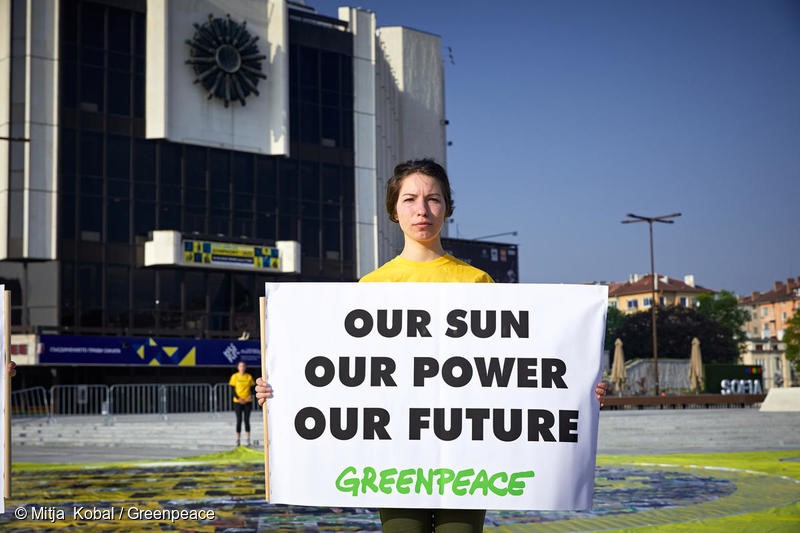Negotiations on EU renewables directive enter final stage
Greenpeace EU media briefing
On 17 May, negotiators representing European governments, the European Parliament and the European Commission will hold crunch talks on Europe’s renewable energy laws.
The talks will determine the EU’s 2030 renewable energy target, as well as the laws governing renewable energy projects involving power companies, local communities and households. The negotiators are meeting for a third round of talks. A fourth, and potentially last, session will take place on 29 May.
A decision to boost renewables could accelerate the transformation of Europe’s energy system, leading to almost half of all Europeans producing their own renewable energy by 2050, and helping the European Union fulfil its obligations under the Paris climate agreement. But most governments are reluctant to take away control of the energy system from a handful of heavily subsidised power companies.
|
Greenpeace EU energy policy adviser Ansgar Kiene said: “Our governments like to talk about Europe’s leadership on climate change, but they are attacking the rights of ordinary citizens to participate in a transition to renewable energy. All the while, they continue to bankroll coal, gas and nuclear power companies. It’s time to turn words into action.” |
What is at stake?
Negotiators are debating what Europe’s 2030 renewable energy target should be. The target will set the minimum amount of energy that should be delivered by renewables across Europe by 2030.
In 2014, EU leaders backed a minimum 27 percent target. However, this does not take into account EU commitments under the Paris climate agreement.
The European Parliament supports a minimum 35 percent target, while NGOs have called for a minimum 45 percent renewables target.
Other measures under consideration, which are backed by the European Parliament, would enable Europeans to take a more active role in a renewable energy transition by, for example, encouraging the use of smart meters and solar panels. For the first time, the EU could recognise the right for citizens to produce, store and sell renewable electricity, free from red tape and punitive charges, including taxes on the renewable energy that people produce and consume themselves.
Despite some support from countries like Greece, Belgium and Ireland, EU governments, led by Germany, Spain, France and the UK, are strongly opposed to any meaningful measures to encourage households, local communities or small businesses to play a growing role in Europe’s energy system.
Spain has itself introduced one of the most restrictive regimes on solar power in the world, which has led to a dramatic reduction in investments in rooftop solar. The Parliament’s lead rapporteur, José Blanco Lopez, has said it is his priority to put an end to the Spanish ‘sun tax’, and ensure a minimum set of rights for European citizens to play an active role in Europe’s energy transition.
Other controversial issues
Another controversial issue is electricity sharing or ‘virtual net metering’, which allows people who do not own their own roof to participate in renewable energy projects elsewhere. For example, electricity generated by solar panels on one roof could be credited to the bills of people in other buildings participating in the project. Municipalities can also use this electricity sharing to place solar panels on the most suitable roofs and give the electricity credits to those who need them most. For example, the Greek city of Thessaloniki has installed solar panels on the roof of a high school and gave the electricity credits to a domestic abuse shelter nearby. Belgium and Slovenia are also considering introducing legislation that would allow electricity sharing.
EU negotiators are also discussing rules on bioenergy, including a new renewable target for transport, which risks being filled with unsustainable biofuels made from palm oil and soy. Rules to improve the sourcing and use of wood from forests to produce electricity, including restricting the burning of biomass to highly efficient power plants, are too weak to prevent forest degradation, while doing little to cut carbon emissions.
Rooftop revolution potential
Community or citizen energy has an enormous and largely untapped potential. Areport by CE Delft, commissioned by Greenpeace, Friends of the Earth, REScoop.eu and EREF in 2016, showed that over 112 million citizens could meet 19 percent of Europe’s electricity demand by 2030. By 2050, over 264 million Europeans – half of all Europeans – could cover as much as 45 percent of Europe’s electricity demand.
By making the right choices today, the next decade could see households, local cooperatives, cities and small businesses massively investing in renewables to power everything from schools to businesses. Citizen energy can also help tackle energy poverty through so-called ‘social solar’ public projects that provide low-income households with access to cheap, affordable renewable energy, instead of giving them money to heat their homes with fossil fuels.
Contacts:
Tara Connolly – Greenpeace EU energy policy director: +32 (0)477 790416, [email protected]
Greenpeace EU press desk: +32 (0)2 274 1911 [email protected]
For breaking news and comment on EU affairs: www.twitter.com/GreenpeaceEU
Greenpeace is an independent global campaigning network that acts to change attitudes and behaviour, to protect and conserve the environment and to promote peace. Greenpeace does not accept donations from governments, the EU, businesses or political parties.

